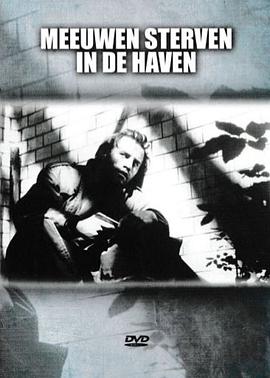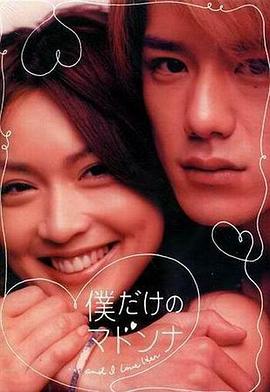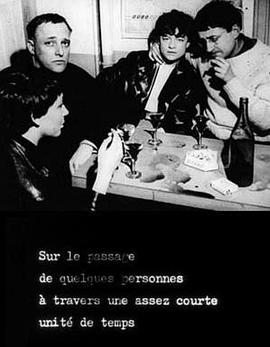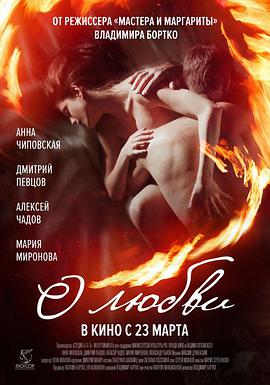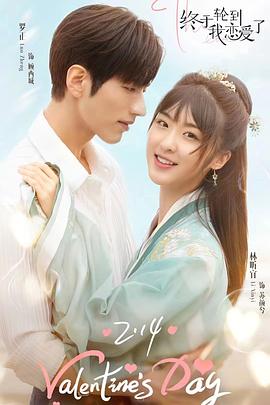于
搜索"于" ,找到 193部影视作品
导演:
/
泷本智行
剧情:
20世纪90年代,泡沫经济破灭的艰苦年代,在某大型公司上班的OL冬木亚纪(永作博美 饰)自强干练,专注干出一番不输于男儿的事业。此前她曾与海外事业部的同期佐藤康(江口洋介 饰)相恋,但最终赌气分手,从此失之交臂。亚纪一步一个脚印,事业小有起色之际结交了趣味相投的男友纯平(池内博之 饰)。她的弟弟雅人(三浦贵大 饰)和患有先心的沙织结婚,瘦小的沙织顽强而徒劳地和命运做着抗争。另一方面,佐藤的婚姻出现问题,身体状况也江河日下。他和亚纪彼此挂念,隔岸眺望,各自回忆着那次大雪之日的归乡旅程。缘分就是这样让人慨叹唏嘘,一旦错过便再难牵手。爱如此之美,又如此易碎易失……
本片根据白石一文的原作改编。©豆瓣
导演:
/
羽原久美子
剧情:
四谷友助(上村祐翔 配音)是一名中学三年级的男生,在班上友助属于默默无闻的那类学生,他既不喜欢结交朋友,在课业上也平平无奇,总是独来独往。一天放学后,友助在意外中穿越到了异世界,让友助震惊的是,他在这里竟然遇见了同班同学新堂衣宇(久保田梨沙 配音)和箱崎红末(和气杏未 配音),她们一个是班级里人气极高的美少女,另一个则体弱多病,总是在病假中。然而,在这个世界里,他们三人是并肩作战的伙伴。 这并不是一个和平的世界,友助一行人要对抗的,是比他们强大的多的敌人,为了获得胜利保住性命,一切都有被利用的价值,甚至是同伴们的生命,亦可拿来作为与对手博弈的棋子。
导演:
/
阿诺·戴普勒尚
剧情:
阿贝尔(让-保罗·罗斯里昂 Jean-Paul Roussillon 饰)和朱诺(凯瑟琳·德纳芙 Catherine Deneuve 饰)两人结婚多年,共同养育着一双儿女,不幸降临到了这个家庭之中,小儿子生病了,只有移植骨髓才能够保住他的性命。在配型未果后,阿贝尔和朱诺决定再生一个孩子,令夫妻两人失望无比的是,这个孩子的骨髓也不适合约瑟夫。就这样,小儿子离开了,但是这个家庭里多了一个名叫亨利(马修·阿马立克 Mathieu Amalric 饰)的新生命。 时间如流水一般逝去,大女儿和亨利之间的关系越来越差,就在这个节骨眼上,朱诺亦被查出患上了和小儿子一样的疾病,而和她的骨髓匹配的只有两人,那就是亨利和亨利那患有严重精神病的小侄子保罗(埃米尔·本宁 Emile Berling 饰)。
导演:
/
永山耕三,泽田镰作
剧情:
铃木恭一(泷泽秀明 饰)是家中唯一的男丁,因此受到了母亲和姐姐的“过度保护”,对这一切忍无可忍的他终于借着念大学的机会从家中搬离,过起了自由独立的生活。可随着时间的流逝,恭一渐渐发现,自己其实并没有脱离母亲的“魔爪”。 一天,恭一深夜打完工回到了家,发现竟然有一名陌生的女子躺在他的床上,就这样,一番波折之后,老实迟钝的恭一和这位名叫须留美(长谷川京子 饰)的神秘女郎相识了。对于恭一来说,须留美的真实身份是一个谜,但在不知不觉中,他又被须留美身上散发出来的乐观奔放所吸引,就在两人关系越走越近之时,恭一的前女友景子(岛谷瞳 饰)亦加入了这混乱的“战局”之中。
导演:
/
居伊·德波
主演:
/
内详
剧情:
Voice 1 (male "professional announcer" type): This neighborhood(1) was made for the wretched dignity of the petty bourgeoisie, for respectable occupations and intellectual tourism. The sedentary population of the upper floors was sheltered from the influences of the street. This neighborhood has remained the same. It was the strange setting of our story, where a systematic questioning of all the diversions and works of a society, a total critique of its idea of happiness, was expressed in acts. These people also scorned "subjective profundity". They were interested in nothing but an adequate and concrete expression of themselves. Voice 2 (Debord, monotone): Human beings are not fully conscious of their real life - usually groping in the dark; overwhelmed by the consequences of their acts; at every moment groups and individuals find themselves confronted with results they have not wished. Voice 1: They said that oblivion was their ruling passion. They wanted to reinvent everything each day; to become the masters and possessors of their own lives. Just as one does not judge a man according to the conception he has of himself, one cannot judge such periods of transition according to their own consciousness; on the contrary, one must explain the consciousness through the contradictions of material life, through the conflict between social conditions and the forces of social production. The progress achieved in the domination of nature was not yet matched by a corresponding liberation of everyday life. Youth passed away among the various controls of resignation. Our camera has captured for you a few aspects of a provisional microsociety. The knowledge of empirical facts remains abstract and superficial as long as it is not concretized by its integration into the whole "” which alone permits the supersession of partial and abstract problems so as to arrive at their concrete essence, and implicitly at their meaning. This group was on the margins of the economy. It tended toward a role of pure consumption, and first of all the free consumption of its time. It thus found itself directly engaged in qualitative variations of everyday life but deprived of any means to intervene in them. The group ranged over a very small area. The same times brought them back to the same places. No one went to bed early. Discussion on the meaning of all this continued... Voice 2: "Our life is a journey "” In the winter and the night. "” We seek our passage..."� Voice 1: The abandoned literature nevertheless exerted a delaying action on new affective formulations. Voice 2: There was the fatigue and the cold of the morning in this much-traversed labyrinth, like an enigma that we had to resolve. It was a looking-glass reality through which we had to discover the potential richness of reality. On the bank of the river evening began once again; and caresses; and the importance of a world without importance. Just as the eyes have a blurred vision of many things and can see only one clearly, so the will can strive only incompletely toward diverse objects and can completely love only one at a time. Voice 3 (young girl): No one counted on the future. It would never be possible to be together later, or anywhere else. There would never be a greater freedom. Voice 1: The refusal of time and of growing old automatically limited encounters in this narrow, contingent zone, where what was lacking was felt as irreparable. The extreme precariousness of the means of getting by without working was at the root of this impatience which made excesses necessary and breaks definitive. Voice 2: One never really contests an organization of existence without contesting all of that organization's forms of language. Voice 1: When freedom is practiced in a closed circle, it fades into a dream, becomes a mere representation of itself. The ambiance of play is by nature unstable. At any moment "ordinary life"� can prevail once again. The geographical limitation of play is even more striking than its temporal limitation. Any game takes place within the contours of its spatial domain. Around the neighborhood, around its fleeting and threatened immobility, stretched a half-known city where people met only by chance, losing their way forever. The girls who found their way there, because they were legally under the control of their families until the age of eighteen, were often recaptured by the defenders of that detestable institution. They were generally confined under the guard of those creatures who among all the bad products of a bad society are the most ugly and repugnant: nuns. What usually makes documentaries so easy to understand is the arbitrary limitation of their subject matter. They describe the atomization of social functions and the isolation of their products. One can, in contrast, envisage the entire complexity of a moment which is not resolved into a work, a moment whose movement indissolubly contains facts and values and whose meaning does not yet appear. The subject matter of the documentary would then be this confused totality. Voice 2: The era had arrived at a level of knowledge and technical means that made possible, and increasingly necessary, a direct construction of all aspects of a liberated affective and practical existence. The appearance of these superior means of action, still unused because of the delays in the project of liquidating the commodity economy, had already condemned aesthetic activity, whose ambitions and powers were both outdated. The decay of art and of all the values of former mores had formed our sociological background. The ruling class's monopoly over the instruments we needed to control in order to realize the collective art of our time had excluded us from a cultural production officially devoted to illustrating and repeating the past. An art film on this generation can only be a film on its absence of real creations. Everyone unthinkingly followed the paths learned once and for all, to their work and their home, to their predictable future. For them duty had already become a habit, and habit a duty. They did not see the deficiency of their city. They thought the deficiency of their life was natural. We wanted to break out of this conditioning, in quest of another use of the urban landscape, in quest of new passions. The atmosphere of a few places gave us intimations of the future powers of an architecture it would be necessary to create to be the support and framework for less mediocre games. We could expect nothing of anything we had not ourselves altered. The urban environment proclaimed the orders and tastes of the ruling society just as violently as the newspapers. It is man who makes the unity of the world, but man has extended himself everywhere. People can see nothing around them that is not their own image; everything speaks to them of themselves. Their very landscape is alive. There were obstacles everywhere. There was a cohesion in the obstacles of all types. They maintained the coherent reign of poverty. Everything being connected, it was necessary to change everything by a unitary struggle, or nothing. It was necessary to link up with the masses, but we were surrounded by sleep. Voice 3: The dictatorship of the proletariat is a desperate struggle, bloody and bloodless, violent and peaceful, military and economic, educational and administrative, against the forces and traditions of the old world. Voice 1: In this country it is once again the men of order who have rebelled. They have reinforced their power. They have been able to aggravate the grotesqueness of the ruling conditions according to their will. They have embellished their system with the funereal ceremonies of the past. Voice 2: Years, like a single instant prolonged to this point, come to an end. Voice 1: What was directly lived reappears frozen in the distance, fit into the tastes and illusions of an era, carried away with it. Voice 2: The appearance of events that we have not made, that others have made against us, now obliges us to be aware of the passage of time, its results, the transformation of our own desires into events. What differentiates the past from the present is precisely its out-of-reach objectivity; there is no more should-be; being is so consumed that it has ceased to exist. The details are already lost in the dust of time. Who was afraid of life, afraid of the night, afraid of being taken, afraid of being kept? Voice 3: What should be abolished continues, and we continue to wear away with it. We are engulfed. We are separated. The years pass and we haven't changed anything. Voice 2: Once again morning in the same streets. Once again the fatigue of so many similarly passed nights. It is a walk that has lasted a long time. Voice 1: Really hard to drink more. Voice 2: Of course one might make a film of it. But even if such a film succeeds in being as fundamentally disconnected and unsatisfying as the reality it deals with, it will never be more than a re-creation "” poor and false like this botched traveling shot. Voice 3: There are now people who pride themselves on being authors of films, as others were authors of novels. They are even more backward than the novelists because they are unaware of the decomposition and exhaustion of individual expression in our time, ignorant of the end of the arts of passivity. They are praised for their sincerity since they dramatize, with more personal depth, the conventions of which their life consists. There is talk of the liberation of the cinema. But what does it matter to us if one more art is liberated through which Tom, Dick or Harry can joyously express their slavish sentiments? The only interesting venture is the liberation of everyday life, not only in the perspectives of history but for us and right away. This entails the withering away of alienated forms of communication. The cinema, too, has to be destroyed. Voice 2: In the final analysis, stars are created by the need we have for them, and not by their talent or lack of talent or even by the film industry or advertising. Miserable need, dismal, anonymous life that would like to expand itself to the dimensions of cinema life. The imaginary life on the screen is the product of this real need. The star is the projection of this need. The images of the advertisements during the intermissions are more suited than any others for evoking an intermission of life. To really describe this era it would no doubt be necessary to show many other things. But what would be the point? Better to grasp the totality of what has been done and what remains to be done than to add more ruins to the old world of the spectacle and of memories. 1. This film, which evokes the lettrist experiences at the origin of the situationist movement, opens with shots of the Paris district frequented by the lettrists in the early 1950s.
导演:
/
赵淑彬
剧情:
太平村是个美丽的村庄,村子通往县城的仅有一条坑坑洼洼的柏油路。水根在路边有个简易的修理站,修理来往的摩托车。他有个梦想就是可以拥有一辆属于自己的摩托车,载着小雪兜风。小雪是村小的教师,班上有一群淘气又聪明的孩子。课上大家尊敬地称呼她老师,课下大家都亲切地称她为姐姐。水根和小雪从小一起长大,感情非常深厚。长大后,水根与小雪顺理成章的走到一起,水根和小时候的玩伴大为相约一起举行婚礼,再过不了多久他们就要结婚了。一天晚上,路上过往的一辆摩托车发生故障到水根的修理站维修,车主是个摄影爱好者。对眼前的美景流连忘返,想在村里多留几天拍些风景。水根熬了个通宵把车修好,天刚亮他就去找小雪,小雪在学校带着孩子们早煅练,他抱起小雪坐在摩托上,水根缓缓地开着车,车后跟着一群兴奋的孩子还有小雪家的土狗。水根越开越快,就在这时意外发生了。车翻到深沟里。摩托车整个压在水根的右腿上。他们被送往医院,医生说要把水根的腿截肢,否则会有生命危险。小雪只受了些皮外伤,调养几天就能回家。这时离他们的婚期越来越近了。因为这次意外,小雪父母都极力反对这桩婚事,于是他们就把小雪锁在房间里。小雪明白对于水根她背负着一份责任。她通过班上学生的帮助逃出了家门,去了医院。水根六岁丧父,家里只有年迈的母亲。白天小雪给孩子们上课,晚上照顾水根,为他擦身喂饭,还做一些手工赚些零钱。这一切水根的母亲都看在眼里,虽然小雪极力拒绝,但是水根母亲还是把家传的戒指戴在小雪的手上。和大为约定的婚期到了,而水根的婚事因腿还没完全康复只能推迟举行,小雪一人去参加了大为的婚礼。路上,她感到了身体强烈的疼痛,但她还是强打着精神。婚礼很隆重,那天,大为等人很受小雪感动,大家都主动借钱给小雪。晚上,小雪回到医院,给水根带去了大为家的饭菜。水根边吃边开始流泪。他决定等自己病好了就还小雪自由让她去找寻幸福。几周后,水根出院,他努力说服自己去接受小雪即将会离开他,却没想到小雪却主动提出了择日完婚。小雪还是像往常一样给学生上课,虽然他们还没有结婚,但她还是帮水根家做些家务。这些天,小雪的身体越来越差。有一回,她在水根家做饭时突然感到疼痛难耐,水根母亲陪着她去医院检查,原来小雪得了子宫颈腺癌。水根母亲没有多少文化,医生解释说子宫颈腺癌是种处女也会得的恶性肿瘤,必须切除子宫以延长生命。而切除子宫就导致无法生育。在回家的路上水根母亲就暗下决心,一定要阻止这门亲事。于是她回到家,对水根谎称一个远房亲戚在城里可以介绍工作。水根根本不知小雪已生病住院,于是他去了城里。而这一去就是半个月,小雪一直郁郁寡欢为什么水根没有去看她。而被水根的母亲告知水根去远房姑妈那相亲去了,小雪就觉得痛不欲生。此时,水根从城里回来,他去小雪家找小雪却被其父母赶了出来,他一头雾水,而小雪却一直想跟水根谈谈,就不顾父母的阻拦去了水根的修车部,之前的误会解除,那一夜他们依偎在一起,小雪非常喜欢孩子,她想跟上天赌一把,她早已在心里做好抉择,她想为水根生个孩子让他们的爱情延续,也算是她自己生命的延续,于是她和水根发生了关系。之后小雪告诉水根自己得了子宫颈腺癌,要把子宫切除才能保住生命,但是她又想要个孩子。水根知道后骂小雪傻,于是他想带着小雪去医院复诊。水根回家拿钱,水根的母亲以死要挟,还把水根锁在柴房里不让他出去。门内是水根声嘶力竭的哭喊,门外是水根母亲默默抹泪。而此时小雪在村口等水根,她等了整整一夜,最后只有失望而归。因为父亲的早亡,水根非常孝顺,他知道母亲这么做的原因。但又对小雪感到内疚与自责。于是他答应母亲不跟小雪结婚,但要帮她把病治好。在母亲的一再要求下,水根立下了字据。水根陪小雪去了医院,安顿下来后,他脱了外套要去给小雪打热水,并没发觉字据掉到了地上。小雪看到了字据上的内容,非常伤心。但她还是明白了水根的苦衷。于是她决定离开。等水根回到病房的时候,只看到病床上小雪留的一张字条。水根到处找小雪,但一直没有找到。几天后噩耗传来,小雪去世了。小雪骨灰下葬的那天,水根去了,但是遭到了小雪父母的谩骂。水根情绪非常低落,之后天天偷偷到小雪的墓前去。小雪的父母有一回撞见了他,于心不忍就把小雪临走时留下的一封信给了水根。水根打开信封,里面是一封写满他们俩曾经共同回忆的信,还有一枚他熟悉的他们家祖传的戒指。几天后,水根去参加另一个发小的婚礼,婚礼上他想到了曾经小雪对他的照顾,而他却辜负了她的心。水根满心内疚,决心要离开这个伤心的地方。两年后。邮递员骑着车轻快的驶在农村的小路上,到了小雪家,给小雪父母一张汇款单。小雪的母亲打开抽屉放进去,里面是一摞汇款单。邮递员又来到水根家,敲门没有人应,就把汇款单塞进了门逢里。静静的屋子里,水根的母亲佝偻着身子坐在藤椅上。
导演:
/
雅克·里维特
剧情:
故事发生在1957年的法国巴黎,安妮(贝蒂·施奈德 Betty Schneider 饰)在哥哥的带领下参加了一个聚会,在聚会上,她邂逅了特里(弗朗索瓦丝·佩武 Françoise Prévost 饰)和戏剧导演杰拉德(贾尼·埃斯波西托 饰),杰拉德正在排演一出莎士比亚的戏剧,剧组遭遇了经济困难,为了帮助杰拉德攻克难关,安妮决定加入剧组。 特里的男友胡安前段时间遭遇了不测,虽然表面看来他是自杀身亡,但特里和安妮都觉得其中必有蹊跷。菲利普(Daniel Crohem 饰)从美国逃亡到法国,他告诫特里和安妮,让她们注意自己的人身安全,不要重蹈胡安的覆辙。在排演的过程中,安妮一直试图寻找着胡安自杀的真相。
导演:
/
朱拉·亚库比斯克
主演:
剧情:
This is a very bizarre fairy tale. It commences with a wedding and singing and dancing but nearly the whole village is wiped out by wolves. The bride gives birth to a daughter several months later and promises her to the boy who saved her. Ten years later there is another disruption when Some circus folk come by and the villagers trick them into staying. Tragedy ensues... This has a strange cast, dwarfs, giants, priests and occasional intrusions from the modern world in the form of the police and a wonderer who returns bringing to the village the good news of Nostradamus. It is a long film but it honestly does not drag. and if you get bored of the plot you can always look at the sumptuous Countryside.
导演:
/
亚历山大·佩恩
剧情:
66岁的施密特先生(杰克•尼科尔森 Jack Nicholson 饰)退休赋闲在家,无所事事的生活让他颇感无聊。每天依旧7点起床,可是陪伴他的只是无聊的字谜游戏和令人生厌的妻子,施密特需要找点事来改变自己的生活,于是他打算资助一位坦桑尼亚的孤儿恩度古,并提笔给他写了第一封信。妻子的忽然离世让他的生活显得更加冷清,他曾至开始想念那个乏味的女人,可是就在这时,他在妻子的换衣间里找到妻子和另一个男人的情书。施密特决定独自驾车去旅行,他去了很多曾经生活过的地方,回忆当年感慨良多。在一时冲动亲吻一位有夫之妇之后,他慢慢的原谅了自己的妻子。女儿的婚姻比自己想像的更糟,平庸的丈夫和不可思议的家庭让他对女儿的未来愈加担忧,然而这一切都非他所能改变。旅途中他从未停止给恩度古写信,在信里,施密特详尽的描述着自己的生活和困惑。当施密特参加完女儿的婚礼,回到家时意外的收到恩度古的回信,看着那些简单的文字和恩度古充满童真的图画,施密特忽然泪如泉涌……
导演:
/
Justin Thomas Ostensen
剧情:
创作进入瓶颈的知名作家杰克(爱德华·福隆 Edward Furlong 饰),为了写出足够恫吓人心的恐怖之作,在经纪人的安排下来到了冰天雪地的山区。单亲妈妈佩妮(克莉丝汀·布丝 Kristin Booth 饰)带着儿子科尔接到了杰克,并将其带回丈夫曾经经营的屠宰场。佩妮风趣幽默,屠宰场内的摆设也足够阴森。谁知刚刚还有说有笑的佩妮,突然一转身将杰克锁在屠宰室内,声称是受经纪人所托,要在接下来的五天内逼迫杰克写出合格出色的剧本。 郁闷的编剧身不由己,只得就地取材,将所处的环境和遇到的人和事编入故事中。创作似乎有条不紊地进行着,但意想不到的是也即将发生……
导演:
/
赵天宇
剧情:
妈妈季佩珍(徐帆 饰)是这个家的灵魂所在,她像有分身术一样能照顾到每一个人。在她的面面俱到之下,这个家看上去井然有序,然而事实并非如此。在妈妈季佩珍眼里女儿李小美(张婧仪 饰)永远都是最优秀的,却不知在北京工作生活的她还有另一面。女儿对妈妈的掌控有多抵触,季佩珍更是不了解。医生丈夫李文舫(许亚军 饰)因几年前的一次失误,至今还无法拿起手术刀。婆婆患有阿尔兹海默症,生活都无法自理……就在身为教师的季佩珍刚刚退休,似乎能松一口气多拥有些自己的时间,却被查出了恶性肿瘤四期。如果妈妈只剩下四个月的生命,这家人的生活又该如何继续下去呢?
导演:
/
弗拉基米尔·博尔特科
主演:
剧情:
妮娜(安娜·车波夫斯卡 Anna Chipovskaya 饰)和丈夫亚历山大(阿雷克西·查多夫 Aleksei Chadov 饰)之间的感情非常要好,两个人一个拥有美丽的样貌,一个拥有丰富的学识,他们的婚姻一直都是朋友们眼中的典范。然而,当严重的财政危机击中了这个家庭后,妮娜和亚历山大开始渐行渐远,两人的婚姻出现了裂痕。 亚历山大欠了银行一大笔钱,而负责处理这笔债务的,是名叫谢尔盖(Dmitri Pevtsov 饰)的男子。虽然谢尔盖也有着自己的妻子和家庭,可是,在同妮娜相处的过程中,两人不可自持的产生了背德的感情。在这股感情的漩涡里,妮娜越陷越深。









